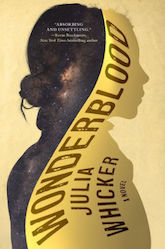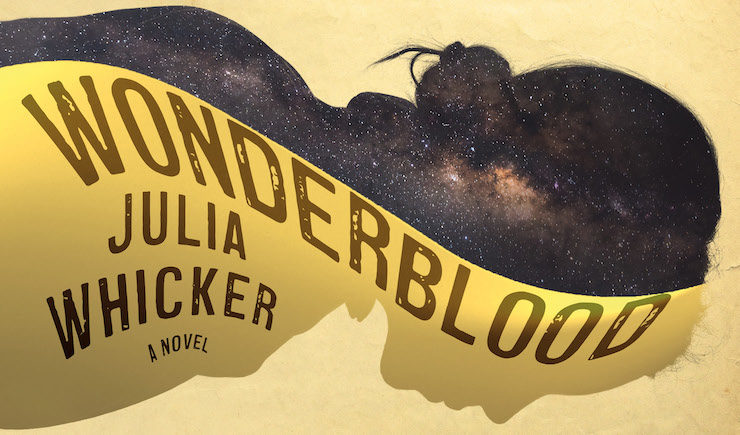Julia Whicker’s debut novel, Wonderblood, is set 500 years from now in a barren, disease-ravaged United States that bears more resemblance to Europe of the Middle Ages than a far-flung future. A mad cow-like disease, Bent Head, has decimated the population; the survivors rove about in bloodthirsty traveling carnivals, beheading one another unrestrainedly and, in a delightful bit of invention, worshiping departed NASA space shuttles and awaiting their return. As the novel opens, mysterious comet-like lights burn across the sky and the sinister, charismatic Mr. Capulatio, whose carnival sets the bar high for decapitation and mayhem, gathers an army and steals himself a (second) bride.
In this world religion and magic have displaced science, astrology supersedes astronomy, and the feudal king—descended from astronauts—rules from a palace built over the wreckage of Cape Canaveral. The citizenry collects and preserves the heads of their enemies—and friends—for magical purposes; medicine is forbidden; human sacrifice is de rigueur (“Wonderblood” refers to a religious doctrine in which only human blood can contain the spread of disease); nobody takes baths.
Buy the Book


Wonderblood
The story is told from the shifting perspectives of several main characters: Aurora, the child-bride kidnapped by Mr. Capulatio; John, hapless court astronomer to the current king, Michael; and Marvel the Hierophant, a devious personage with a shady, murderous past and uncertain present ambitions. All of the characters are navigating the destinies of their respective religious visions: Is the rule of Mr. Capulatio foretold by scripture? Is Aurora his prophesied queen? And are the lights in the sky the fabled shuttles, returning to Earth? Or meteors about to blow it to bits? (During a few of the novel’s grimmer passages, one comes to feel that the wholesale destruction of the planet would come as rather a relief to a number of its characters.)
Wonderblood is a difficult, fascinating book, spectacular in the literal sense: blood rains from the sky, battles seethe, grotesque prophetesses are shut up in fabulist towers, queens build lapis lazuli chambers and leisurely golf while the world burns (based on the book’s publication schedule, Whicker called that one long in advance). In places, its imagery is dazzlingly incandescent; elsewhere, its plot all but grinds to a halt as characters confer for pages about convoluted and un-engaging intrigues. Its future is relentlessly grim and bloody but marvelously imagined and original, and while Whicker’s characters stab, chop, torture, and amputate with Game of Thrones-esque abandon, the novel is refreshingly free of sexualized violence. (Incest and bigamy, yes: on-page assault, blessedly no.)
Whicker is a beautiful writer; even when the plot’s engine fails to rev her sentences shine, and the novel’s vivid imagery reads like Angela Carter by way of Hieronymus Bosch. And, while I found Marvel and John’s storylines hard to follow and ultimately unrewarding, her female characters are all standouts: Aurora, initially a passive, terrorized observer, who slowly learns to wield her own power; Michael’s queen, Allyson, a divinely realized dilettante; and Mr. Capulatio’s first wife, Orchid, a deranged oracular executionatrix who is perhaps the fiercest and most fascinating of all Whicker’s wild menagerie.
Wonderblood—an apocalyptic vision of an anti-science future driven by demagogues, religious mania, uncontrollable disease, and superstition—feels uncomfortably prescient when read against the backdrop of my newsfeed. Station Eleven’s ultimately benevolent Obama-era vision of humanity managing through catastrophe this is not. I found myself wishing that Whicker would work even further through the ramifications of her future: the novel fails entirely to deal with race, xenophobia, or the ways in which modern-day persecution of immigrants, people of color, and indigenous and Muslim people might unfurl centuries hence. Likewise, it’s unclear how climate change or environmental collapse factors in to the novel’s vision (five hundred years from now, Cape Canaveral will almost certainly be underwater).
But for all its flaws, Wonderblood is a remarkably impressive debut novel: striking, original, and fantastically inventive. I will eagerly await whatever Julia Whicker does next.
Wonderblood is available from St Martin’s Press.
Read an excerpt from the novel here.
Sarah McCarry is the author of three novels: All Our Pretty Songs, a Tiptree Award honoree; the Norton award-nominated Dirty Wings; and the Lambda award-nominated About A Girl.










